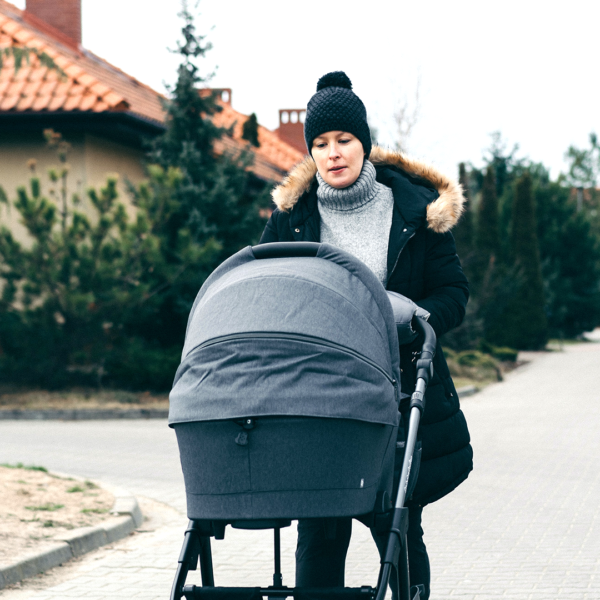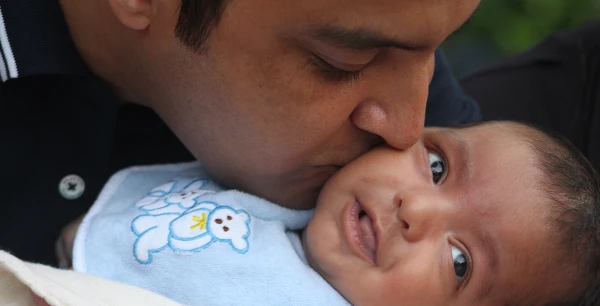Newborn Sleep Patterns — How to Nurture Your Baby the First Months
One of the top questions new parents ask is “How can I encourage good newborn sleep patterns with my baby?” They often wonder what they can do to help their babies take better naps and to sleep through the night.
First, you must understand that the newborn months come with a “different” set of rules. Contrary to what you might think, have read, or been told, “sleeping through the night and/or taking long naps” are not markers of a good baby or what constitutes a great sleeper. As parents, these are expectations that we hope to meet with our babies, but it’s important to keep expectations real during this time. Good sleep evolves from a few things. It is a combination of getting the sleep you need as well as ensuring you are receiving quality sleep. When we sleep well, we should feel rested and recharged, both physically and mentally.
Learn to:
- Make a plan for the first weeks
- Help your newborn adjust to day and night
- Create a sleep haven for your baby
Make a Plan for the First Weeks
During these early months, when your baby is going through a rapid period of growth, he will require more sleep. Those newborn sleep patterns are very unpredictable in the first 6 to 8 weeks of life. Your baby will not have much consistency as to when and how long he sleeps throughout the day and night. He may sleep all day and want to be up all night as his day and night cycles will not be set in the early weeks.
You’ll be more prepared if you expect that your baby will be waking every 2-3 hours for a feeding around the clock. That means BOTH day and night. His tummy is very small and he will need to wake frequently to eat and have his needs met. In order to help everyone adjust during this time, it will be important to gather support and make a plan.
The key to good sleep during this time is to rest whenever you can. If it’s at all possible, nap when your baby naps, and go to sleep at night when your baby does. Share baby duties with anyone who is willing to help. Call in support and have others help with cleaning, shopping, meals, and siblings. If your partner is able, set up a schedule so that each of you can take shifts, ensuring that you both have block of sleep of at least 3-5 hours.
Take heart, and know that sleep will not always be this challenging. Things will begin to start taking shape when your baby reaches 6-8 weeks old. Until that milestone, plan on being creative at scheduling in sleep for yourself and your partner. It’s important to get rest when you can, so do your best to make it a priority.
Want to know what you can do before sleep training?
Read: Newborn Sleep Schedule: What You Can Do for Some Sleep

Help your Newborn Sleep Patterns by Emphasizing Day and Night
Newborns have a tendency to sleep all day in the midst of lots of noise and activity and be up more at night after they are first born. You may have noticed this pattern while you were pregnant. You may recall how your baby would be quiet and still during the day but kick up his activity at night while you were trying to sleep. Most likely, you are not thrilled with the midnight party train after returning home with your new baby.
As adults, our bodies are cued to feel sleepy at night and awake during the day. In a perfect world we would like our baby’s sleep cycles to be in sync with our own. The good news is that you can gently help your baby adjust to more normal sleep cycles very early on. Begin helping him shift things when he is at least a week or older.
During the day, expose your baby to lots of sunlight or brightly lit areas inside when he is awake. You may also want to go outside for a walk, which will expose your baby to sunlight and fresh air. Sunlight is a natural environmental cue that helps set your baby’s day and night rhythms, making him feel more awake during the day and helping him sleep better at night. A daily walk in the morning or early afternoon hours will provide you with some gentle exercise and help everyone sleep better at night.
Encourage some healthy and developmentally appropriate play time when he is alert. This can be simple such as: singing songs or taking him around the house pointing out different objects. Tummy time, activity mats, and play gyms are all great options as your baby grows and has longer periods of alertness.
To further promote better sleep at night for your baby, keep his sleep environment dark and only turn on a dim nightlight if absolutely necessary for feedings, diaper changes, etc. When your baby wakes, tend to him quietly and then quickly get him back to sleep afterwards. This will help set the tone that nighttime is for sleeping and not playing.
Need some tips on soothing your fussy baby?
Read: Soothing a Fussy Baby: Using Motion and Cues to Calm the Crankiness

Create a Sleep Haven for Your Baby
Create a sleep space for your baby that is relaxing and conducive to sleep. Here are some simple ways to optimize your baby’s sleep environment:
- Make sure the room is dark. Use blackout shades, curtains, or blinds to help darken the room and keep early morning rays out.
- Keep televisions, computers, cell phones off while your baby is sleeping in his room at night. Studies have shown that the light emitted from electronics can overstimulate the brain and make it harder for your baby to fall asleep and stay asleep.
- White noise is a very effective tool that can help your baby sleep better. Actual “white noise” is the best rather than ocean waves or sounds of trains, birds, etc. Keep the white noise on during the entire sleep duration and turn it off as soon as your baby wakes.
- Swaddling during the newborn months can help extend sleep periods and help if your baby is sensitive to the startle reflex. Make sure to always put your baby to sleep on his back and practice safe sleeping.
- Keeping your baby close by can help you manage feedings more efficiently and make it easier for you to settle and get your baby back to sleep quickly when he does wake.
Want to know more about sleep environments?
Read: The Benefits of an Early Bedtime — Tips from the Sleep Lady
These few tips can help gently nurture your baby into nice sleep patterns. In these early weeks you will need to make a bit of investment in helping them along. You may notice a big difference or subtle changes but rest assure that over time these things will lead to healthy and smooth sleep patterns in your baby.



